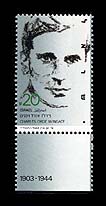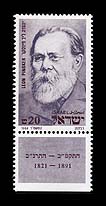|
Charles Orde Wingate, the founder of the Special Night Squads, was born on the 26th February 1903 in India. His father was a member of a religious group who believed neither in the ceremonial of the Church nor in the status of its priests. Their faith and form of worship was based on study of the Bible from which Charles Orde Wingate derived his deep religious feelings combined with a love for the land of Israel and the Jewish people. Orde went to school in England and at the age of 20 was commissioned into the Royal Artillery. From 1928-33 he was attached to the Sudan Defence Forces in which he gained valuable military experience.
In 1936 when bloody rioting broke out in Palestine, he was posted there as an Intelligence Officer. He developed a deep friendship with the Jewish settlers, learnt Hebrew, became a believer in Zionism and a confidant of the Hagana High Command. He drew up a plan for direct attacks on the Arab gangs and helped the Jewish Agency organize and train Special Night Squads which were based in En Harod and carried out successful operations all over the country. In recognition of his achievements he was awarded the Distinguished Service Medal and became acquainted with the British General commanding the troops in Palestine, General Wavell.
Wingate supported the idea of a Jewish State, believing as he did, that the Jewish people had a destiny to fulfil in Eretz Israel.
During the disturbances of 1937-39 the Hagana turned to Wingate as their military adviser. But Wingates support for the Jewish cause earned him the strong disapproval of both the civilian and military authorities in Palestine and in 1939 he was sent back to England to rejoin the Artillery.
Following the outbreak of the second World War he saw service in an Anti-Aircraft unit but in 1940 General Wavell sent him out to Ethiopia where he successfully carried out irregular military operations against the Italians. In 1942 he was appointed to Wavell's staff in India and in 1943 accompanied Churchill to Quebec for the talks with Roosevelt on the Japanese war. On his return to India he was promoted to the rank of Major-General and formed the special units which operated behind the Japanese lines in Burma.
But even in those difficult years the Land of Israel was ever in his thoughts. In a letter to one of his former assistants he wrote "I always think of you and your problems" and added in Hebrew "If I forget thee, 0 Jerusalem, may my right hand lose its cunning". Charles Orde Wingate was killed in a plane crash on the 24th March 1944. When the news reached Eretz Israel, the Jewish National Committee decided to call the planned National Physical Training and Sports Institute after this friend of the Jewish people and the Wingate Institute, to the south of Netanya, was dedicated on the 7th April 1957. A children's village on Mt. Carmel - "Yemin Orde" - also bears his name.
Leon Pinsker, one of the original members of the "Hovevei Zion" movement and one of the fathers of Zionism, was born in Poland in 1821. While a young boy he moved with his parents to Odessa where he attended a Jewish school., He was an outstanding pupil and went on to study law at the University of Odessa and later medicine at the University of Moscow. Pinsker was among the first Jewish students to be admitted to Russian universities. He qualified as a doctor in 1848 and built up a very successful practice.
In the sixties he took up public affairs and turned to journalism and literature. He wrote in Russian, mainly for the Jewish press, on the subject of the plight of the Jews and of the plans of the Czarist regime to encourage anti-semitism and make the Jews the scapegoat for all the regime's oppressive measures.
In April 1881, a month and a half after the assassination of Czar Alexander II, the first of a long series of pogroms broke out. In the course of these pogroms which lasted until 1883, Jewish property was confiscated and robbery and violence became the Jews' daily lot..
Pinsker was deeply affected by the pogroms and at the age of 60 became a changed man. Had he died then, it is likely that he would have been forgotten. Instead he was destined to become famous for developing the thesis that the source of the Jewish people's troubles lay in their being strangers in a strange land, and that their only hope for the future lay in their finding themselves a country of their own (at a later stage, under the influence of the Hovevei Zion, he advocated Eretz Israel as the Jewish homeland). The pogroms encouraged nationalistic sentiment among Russian Jewry and led to the creation of the Hovevei Zion movement.
Pinsker did not, however, pin all his hopes on the oppressed Jews of Russia, but like Herzl, travelled to Vienna, Paris and London, knocking on the doors of leading Jews and explaining to them his plans for a Jewish homeland. But his words fell on deaf ears and he was even regarded as somewhat "crazy". He then sat down and wrote his famous essay "Auto-emancipation" in which he called on the Jewish nation to aid itself and return to national consciousness and a life of territorial independence. The essay which was published anonymously in Germany is regarded as heralding a new era in Jewish history and made a great impression among Jews all over the world.
But western Jewry proved a disappointment - they read the pamphlet but ignored its message. In 1884, Mendele Mocher Sephorim translated the essay into Yiddish and the Russian-Jewish press was full of articles in support of Pinsker's ideas. He began to feel that salvation would come from Russian Jewry and he became a member of the Hovevei Zion.
In the year 1884 the Hovevei Zion held their famous conference at Kattowitz at which Pinsker was elected president of the movement's presidium. In his opening address he emphasized the importance of Jews working the land. The conference elected him head of the temporary central committee of the movement whose headquarters were in Odessa.
It should be noted that Pinsker gave priority to Jewish settlement anywhere in the world including Baron de Hirsch's projects in Argentina, believing that Eretz Israel would serve primarily as the Jews' spiritual centre. In his "Auto-emancipation" Pinsker laid the foundation of Herzl's political Zionism; at Kattowitz - the basis of economic Zionism and settlement policy'; at the end of his days - the spiritual Zionism of Ahad Ha-Am.
Leon Pinsker died at the age of 70 in the year 1891 and was buried in Odessa where he was laid to rest alongside his father, in the presence of a large and distinguished crowd of mourners. The greatest tribute of all was paid him by Herzl himself who remarked to David Wolffsohn, his devoted assistant, "had I not read Pinsker's "Auto-emancipation" I would never have come to write "Der Judenstaat" ("the Jewish State").


